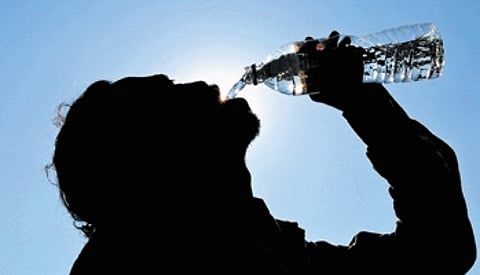

BENGALURU: Drink plenty of water! This advice is often considered a golden rule for good health, but doctors caution that overhydration can be dangerous and deadly.
Drinking too much water can cause hyponatremia a condition where sodium levels in the blood drop to dangerously low levels, potentially leading to severe health issues.
Recently, a 40-year-old woman from Hyderabad suffered seizures and lost consciousness after drinking an excessive amount of water in the morning. She was told that it would help flush out toxins, but the result was that she had to spend four days in the ICU, battling complications from water intoxication.
Experts warn that consuming 1.5 liters of water or more per hour can overwhelm the kidneys and upset the body’s electrolyte balance and that excessive water is unnecessary for detoxification.
In this case, the woman was advised to drink excessive amounts of water in the morning as it would detoxify her body. She was told that consuming large quantities of water immediately after waking up would flush out all the wastes from her system and rejuvenate her skin, improving her overall health.
Doctors explain that kidneys naturally clear the body toxins through urine. The recommended amount of water intake is 2.5 to 3 litres per day, which should be spread out throughout the day as about 20% of daily water requirement also comes from food, especially fruits and vegetables, they said.
Edwina Raj, Head of Services, Clinical Nutrition and Dietetics, Aster CMI Hospital, said water intoxication occurs when excessive water consumption exceeds the body’s requirements, leading to an imbalance in electrolytes by significantly lowering sodium levels in the blood. This can cause symptoms ranging from mild issues like nausea, vomiting, headaches, sweating, and confusion to severe, life-threatening emergencies such as seizures, coma, or even death.
Edwina highlighted that people with kidney disorders, heart failure, or liver diseases are particularly vulnerable, as their organs may struggle to process fluids, resulting in fluid accumulation.
Dr Nasiruddin G, Consultant-Internal Medicine, Fortis Hospital, stressed that low sodium levels, caused by overhydration, can present symptoms ranging from mild lethargy and confusion to severe cases of altered mental status or even seizures that require ICU care. To prevent such complications, dividing the water intake into regular intervals is a safer and healthier alternative, he said.
Doctors highlight that water intoxication can mimic symptoms of other conditions, making it difficult to diagnose quickly.
If left unchecked, it can progress to seizures, brain swelling, and even coma. Unlike dehydration, which develops over time, the effects of hyponatremia can escalate rapidly, especially when water intake exceeds the kidneys’ capacity to process it.